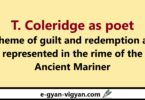
Pope’s contribution to English poetry | Discuss Pope as a poet of correctness
Pope’s contribution to English poetry
The Elizabethan metaphysical poets had taken all sorts of liberties with their language, and indulged in all kinds of excesses. Their faults needed correction, and Pope with his orderly and rational mind endeavoured to rid poetry of the extravagant conceits and romantic excesses. Pope no doubt purged poetry of extravagance, but in so doing, he also purged it of all genuine poetic substance. Pope’s correctness means orderly and lucid expression, which he called return to nature’. Poetry, according to Pope, should be clear and lucid, and should be free from vagueness, obscurity and looseness. This is the first feature of Pope’s poetry.
The second feature of his poetry, and of all good poetry according to Pope, is conformity to the rules of the ancients. The ancient classics provided models of composition, to follow which was to write correct Poetry. Pope himself followed the methods of the ancients, but in doing so he lost their spirit.
Alexander Pope was undoubtedly the leader of the neo-or pseudo classical school of English poetry. He has been regarded as “the splendid high priest of our age of prose and reason, of our excellent and indispensable 18th century.” Warton calls “the residence of virtue and literature.” His poetry is an antithesis to romantic poetry. Romantic poetry is characterized by subjectivity, emotionalism, lyricism and love of Nature, while Pope’s poetry is remarkable for objectivity, reason, correctness, satire and love for town life.
Pope is classicist because he is a classic, probably the greatest of the eighteenth century. He is a great wit, and a critic, a man of sense, of observation and of the world with a keen relish for the elegances of art and nature. He has a quick sense for propriety of thought and manners as established by the forms and customs of society, a refined sympathy with the sentiments and habitudes of human life as he felt them within the little circle of his family and friends. He is, to quote Hazlitt, “the poet, not of nature, but of art.” He, is says Joseph Warton, “a writer adapted to all ages and stations, for the old and for the young, for the man of business and the, scholar.”
He sees nature only dressed by art, he judges of beauty by fashion, seeks for truth in the opinions of the world, he judges of the feelings of others by his own. And in having an exact knowledge of all that he himself loved or hated, wished or wanted, he excels even Shakespeare. He is poet of the man as Society has made him. He has made verse smooth and polished. It would be a great loss to us if Pope’s poetry becomes extinct, observes Dennis. To Lowell Pope ‘still stands unapproachably alone.’ He is, indeed, a poet of thousand years’, the only green patch in the whole prosaic desert of his age.
Far from all these factors, Pope is a classical poet because he imitates the models of the Greek and Roman classics through French. He regards them as :
“Immortal heirs of universal praise :
Whose honours with increase of ages grow.”
In his Essay on Criticism he advocate that all sound judgement and true wit is founded on the observation of Nature; that false wit arises from a disregard of Nature and an excessive affection for the connection for the mind; and that the true standard for determining what is ‘natural’ in poetry is to be found in the best works of the ancients. In his poems he very craftily qualities his subservience to the ancients –
Some beauties yet no precepts can declare,
For there’s happiness as well as care.
Music resembles poetry in each
Are nameless graces which no methods teach,
And which a master hand alone can reach,
But his is not a blind adherence to the ancients.
There is in his work the same stress upon the value of the form as in the ancients, same elegance, same wit and satire as is visible in the satires and epistles of Horace.
Pope is a great English classical poet because he descends low from the Parnassus and crawls on the earth armed with the weapon of the heroic couplet. Besides his attempts to borrow matter from masters like Virgil and Homer, and his attempts to borrow matter from the classic Pope is one of the most ‘correct’ of English poets. He is consummate artist who polishes, chisels and refines his expression with great care, accuracy and labour.
“He has said in the best words what we all know and feel but cannot express and has made that classical, which in weaker hands would be commonplace.” (John Dennis, The Age of Pope). His imagination says Cazamian, does not overstep reason; his logic does not impede the flight of imagination; his sentiment does not encroach on the right or good sense, and his good sense never kills the warmth of sentiment.
English – Important links
- Hero of ‘Paradise Lost’ | Hero of Milton’s ‘Paradise Lost’ | Who is the hero of ‘Paradise Lost’
- A note on Milton’s Grand style
- Paradise Lost as a classical Epic | How does Milton employ classical epic convention in his Invocation in paradise last Book.
- “The heights were within Pope’s reach, and he reached them.” Justify and criticise
Disclaimer: e-gyan-vigyan.com is created only for education purpose and education sector. We only provide links and materials already available on the Internet. If in any way it violates the law or there is any problem then please mail us- vigyanegyan@gmail.com







